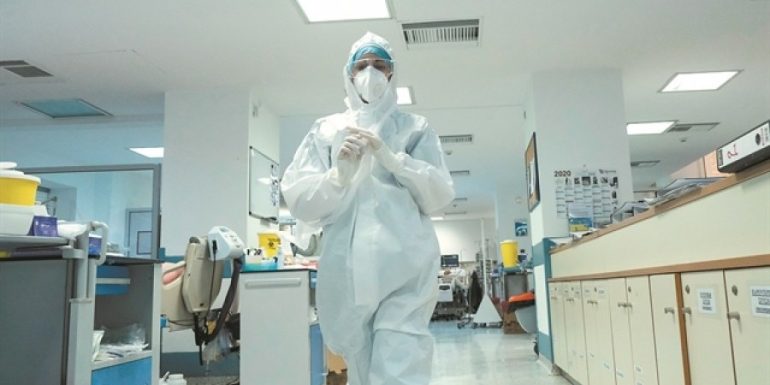The estimates of many scientists for this winter are ominous due to the new Omicron variant that seems to cause a resurgence of the pandemic, due to its high transmissibility and greater immune escape.
The prevailing estimate is now, according to the leading scientific journal "Science", that another major global pandemic wave is inevitable and the crucial question is how many serious incidents Covid-19 will bring. On the other hand, even though Omicron usually causes less severe disease than Delta, the mere fact that it is capable of causing so many cases, even frequent re-infections, sounds the alarm bell for an impending new pressure on already overloaded systems. health of many countries.
Although many questions remain about the new variant, many scientists around the world, as time goes on, feel more and more confident that Omicron is likely to dramatically change the course of the pandemic - not for the better. The new variant has already spread rapidly in more than 70 countries (including Greece), constantly gaining ground against Delta and the other strains of the coronavirus.
"What we are seeing is an impressive rapid spread," said Trolls Lillebeck, an infectious disease specialist at the University of Copenhagen in Denmark, where scientists estimate that it is only a matter of days before Omicron replaces Delta as the dominant variant. Despite the very high rates of vaccination coverage, the Nordic country of about 5 million (with almost half the population of Greece) now records more than 6.000 new infections per day (about the same or more than Greece), twice as many as in the culmination of the previous epidemic wave, which shows in relief the ability of Omicron to spread like wildfire.
Neighboring Norway, with about the same population, now predicts it will have more than 100.000 cases a day (!) In a few weeks, unless people drastically reduce their social contacts - something not easy in the run-up to the holidays. Even though Omicron is generally causing milder symptoms, the expected astronomical number of new infections raises a bleak outlook, warns virologist Emma Hodcroft of the Swiss University of Bern. As he stated, "many scientists already thought that the Delta was going to bring a really difficult winter. "I'm not sure the message has passed on to the people who make the decisions, how much more difficult things are going to be because of Omicron."
Virologists, immunologists, infectious disease specialists and epidemiologists believe that Omicron is another dizzying "dive" that makes the "train of terror" of the pandemic, and even just before the holidays, when everyone was hoping for the exact opposite. After analyzing the data so far, mainly from South Africa, Britain and Denmark, Omicron's "profile" begins to clear up. It is now beyond any doubt that the new variant has a substantial competitive advantage over the other variants. It is less clear to what extent this is because it can better escape the human immune response or because it is inherently more contagious than its precursors. The answer does not play a big role in the short term, but it will be very important in the long run. If its advantage is the immune escape, then Omicron's advantage over Delta will gradually weaken and the two variants will probably end up circulating in parallel. If Omicron is even more contagious, it will probably replace Delta, as Delta did with the previous variants.
As for how good Omicron is in the matter of immune escape, the data so far show that it is indeed easier to lead to re-infection in people who have previously been ill with Covid-19, while antibodies that have been created either by disease or by vaccination, are much less effective against it. The good news is that the third booster seems to increase protection against Omicron infection by about 75%, while protection against serious illness and hospitalization may be even greater.
Although there is evidence that protection against severe Omicron disease remains important in those who have received three doses of the vaccine, Harvard University epidemiologist William Hanitz points out that the question of the severity of the disease is still impossible to answer with certainty, as the new variant has still infected enough people to draw definite conclusions. However, he agrees that even if Omicron turns out to be inherently milder, the volume of its expected cases will probably overload the health systems. "There are not many viruses that can spread so quickly and be harmless in a society that already, without it, already had full hospitals," he said.
Some scientists are also concerned that Omicron may bring other unpleasant evolutionary surprises in the future, e.g. to acquire the ability to escape even better from the immune system. Dr. Florian Kramer, a well-known vaccine specialist at Mount Icahn School of Medicine in Mount Sinai, New York, said he considered it necessary for vaccine manufacturers to develop booster doses tailored specifically to Omicron. But until that happens and the special permits are given by the regulators-supervisors, several months will pass, a very long time for the current data of the new crisis.
Most European countries hope to meet the Omicron challenge in the meantime through the massive booster dose, combined with additional measures such as mandatory mask use, a ban on large gatherings and widespread teleworking, in the hope that will "brake" the new epidemic wave and prevent the collapse of hospitals.
Source: RES-EAP
